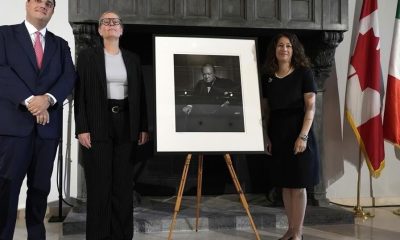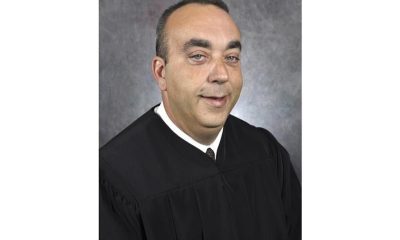In the spring of 1993, Mercury Records put three of its new country signees on a bus and sent them on a 15-city tour intended to raise their profile. It was a hell of an assemblage. There was the troubadour John Brannen, who possessed a rootsy sound and a quaver that channeled Roy Orbison’s. He alternated opening and closing slots with a former Oklahoma oil-field worker and semi-pro defensive end named Toby Keith. Playing in between was a brassy Canadian from a hardscrabble background: Shania Twain. It was Twain, in fact, who ran screaming to the front of the bus to tell Keith—who died Monday at 62—that his debut single, “Should’ve Been a Cowboy,” was playing on the radio.
“Should’ve Been a Cowboy” would top the Billboard Hot Country Singles chart that summer, establishing Keith as the breakout star of the trio. It was one of 10 songs on his 1993 self-titled debut that he wrote, and it established a persona that got him most of the way through the decade: the regretful romantic. It was a good lane, and he navigated it well. But to join Nashville’s growing parade of crossover stars, he had to dig deeper into his bag, both as a writer and as a performer. He pulled it off (with a little help from outside forces), becoming a household name in the process. Those same forces that made him a superstar, however, limited his reach in the end, obscuring a career of remarkable length and versatility.
At the beginning of his career, the strapping Keith was occasionally lumped in with country’s neo-traditionalists, who aimed for a simpler musical and sartorial presentation. These musicians still did tearjerkers, but those tended to be balanced out by leaner, honky-tonk crowd-pleasers. Keith was more interested in the ballads; the only line-dance-friendly cuts on his debut were the two songs he didn’t write. “Who’s That Man” (his second country No. 1) was a minor masterpiece of songwriting: a divorcé visits his family and comes to grips with what happened when he was there (“Turn left at the old hotel / I know this boulevard much too well”) and after.
Similarly aching singles followed, including the plaintive, fumbling love song “Me Too,” which was Keith’s third country No. 1. By now, his burly yearning was practically a trademark. The title track of 1997’s Dream Walkin’ depicts a one-night stand that lingers for a lifetime, delivered with Keith’s typical wryness: “She took my new sunglasses and my old jean jacket / And she never even bothered to ask.” The album also featured his biggest pop move yet: a cover of Sting’s Nashville ready-made “I’m So Happy I Can’t Stop Crying,” with the Englishman himself on bass and backing vocals. The collaboration led to Keith’s first Grammy nomination (and Sting’s only appearance on the country charts to date), but left Keith unfulfilled.
It possibly didn’t help that Twain, his former tourmate, turned her ’97 Mercury Records album into a pop juggernaut. Keith had proved to be a thoughtful craftsman, the rare country star who wrote the majority of his own material. But as contemporaries such as Twain, Garth Brooks, Tim McGraw, and the Dixie Chicks (now just the Chicks) achieved pop-country superstardom, Keith was still looking for his opening. “This is not a business where you compete against each other,” he had mused earlier in his career. “This is like golf. This is one where you play the course.”
When Keith jumped to DreamWorks Nashville (whose patron was the director Steven Spielberg), he embraced a different template: a little hammy, a little randy, reliant on smirks instead of strings. The album titles tell the story well enough: How Do You Like Me Now?!, Pull My Chain, Unleashed. The single “How Do You Like Me Now?!” kicked off a run of 10 country chart-toppers in five years. It was a kiss-off anthem whose sunny chorus belied the cruelty of the verses: “He never comes home, and you’re always alone / And your kids hear you cry down the hall.” It was the top country song of 2000, and the first of 16 Top 40 pop hits for Keith. To put this in football terms, the onetime United States Football League hopeful had implemented a brand-new scheme, then promptly dominated the league.
But the game soon changed. Keith’s seething post-9/11 single “Courtesy of the Red, White and Blue (The Angry American)” gained a cultural notoriety that far outpaced its performance on the radio (a single week at No. 1 on the country charts). One of the rawest songs to ever hit the country airwaves, it leveraged Keith’s unleashed personality to grim ends (“We’ll put a boot in your ass / It’s the American way”). In a field not lacking for contenders, it became the pro-war country song in the pop-culture consciousness, and outside Music Row, it’s arguably Keith’s signature tune.
He finally had the pop profile to rival the McGraws of the world—and having played the course, he was free to cause a ruckus in the clubhouse. Keith’s running feud with the Chicks’ lead singer, Natalie Maines (who publicly ripped the message of “The Angry American”), was shocking for how it dispensed with country’s usual professional chumminess. In time, Keith would express regret at how he reacted (including, famously, putting her picture next to Saddam Hussein’s during concerts). But his initial response revealed that perhaps his changing reputation was bothering him the most: “I’m a songwriter. She’s not.”
Still, “songwriter” would never be a major part of Keith’s public image. Nor was he a culture warrior on the level of Ted Nugent or John Rich; he was as likely to pull a punch as to throw one. The longtime yellow-dog Democrat (and eventual registered Independent) tried to play it down the middle, in the ensuing years—making appearances on The Colbert Report, and praising Barack Obama’s performance as commander in chief on The Joy Behar Show—but for a general audience, there was no altering his profile, only maintaining it; he would remain the angry American.
Which was a shame. Keith remained a reliable hitmaker through the end of the 2000s, in part by reviving the romanticism that fueled his early hits. Only now his attention had shifted from the bedroom to the barroom. For every dutiful piece of grunt work like “American Soldier,” there was an “I Love This Bar,” a hymn to the local watering hole that squeezes tech workers, veterans, and strippers into the same booth. For every “Beer for My Horses” (a disquietingly rousing celebration of vigilante justice featuring Willie Nelson), he wrote an “As Good as I Once Was,” a Brad Paisley–style farce about picking your spots in middle age. “I used to be hell on wheels,” Keith keens on the bridge, with a glimpse of the yearning he so easily summoned at the outset of his career, ”back when I was a younger man.”
Just as the neo-traditionalists had done to pop-country crooners such as B. J. Thomas and Juice Newton, a new crop of country singers supplanted Keith in the 2010s. The double-time yapping of Keith’s “I Wanna Talk About Me” was jettisoned in favor of cadences cribbed from rap. His peers drew on honky-tonk both as style and setting; singers such as Luke Bryan and Jason Aldean were more likely to raise a toast on a tailgate than drop a tear in their beer. (Still, Keith’s last Top 40 hit, the loop-de-looping singalong “Red Solo Cup,” showed that when it came to making bro-country, he was as good as he’d ever been.) Toby Keith—like Kenny Chesney or Twain—used a larger-than-life persona to shift an otherwise fine career into a higher gear. He leaves behind a catalog full of weepers and floor-stompers, delivered with pathos and humor. For detractors (and many fans), he may remain the Angry American, but the last compilation he issued in his lifetime made clear how he saw himself: 100% Songwriter.































